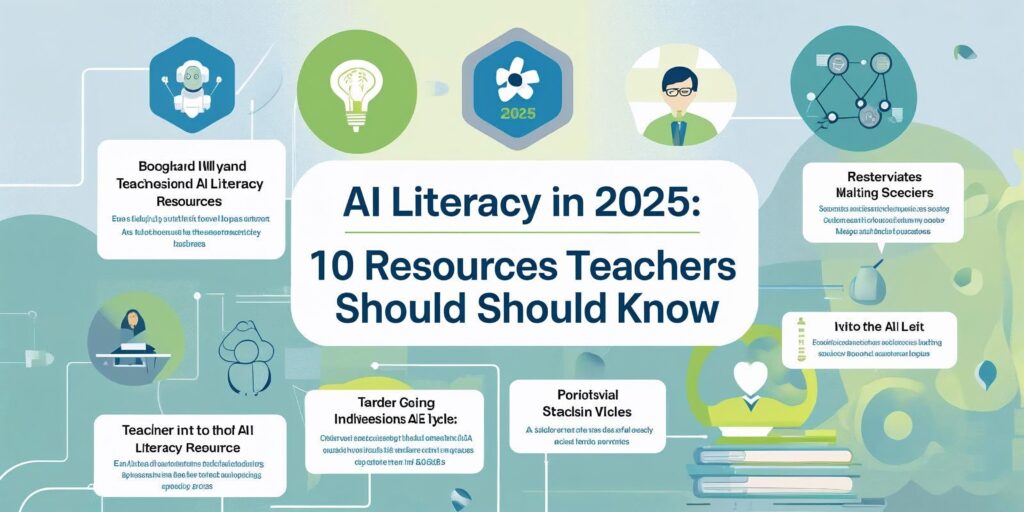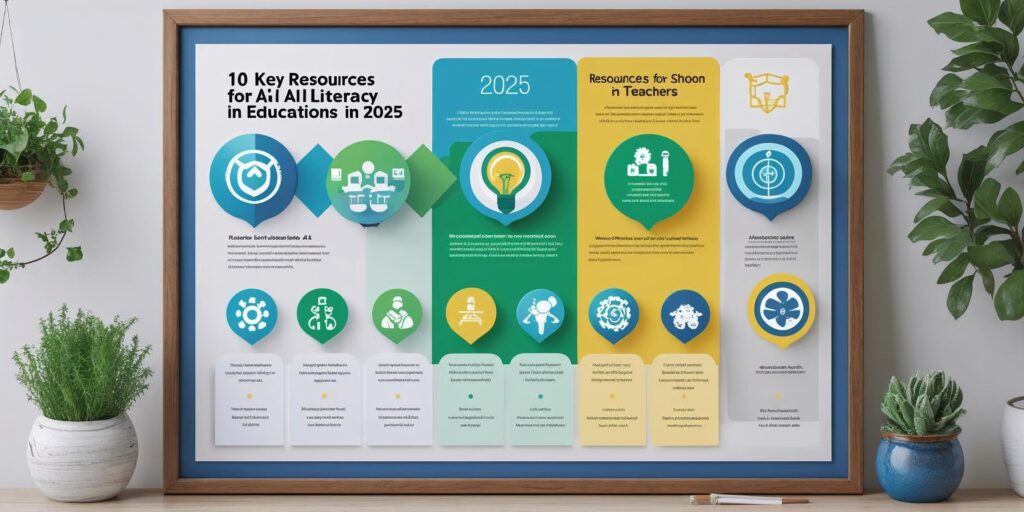🧠 AI Literacy in 2025: 10 Must-Have Resources Every Teacher Should Know

For teachers, educators, and lifelong learners across the globe
🌍 AI Literacy in 2025: Why It’s More Important Than Ever for Teachers
As we know, Artificial Intelligence is no longer just a buzzword. It’s now deeply woven into the fabric of how we teach, learn, and even assess. Let’s see the Global Data regarding AI.
📊 The Latest Global Data (2025):
- According to the UNESCO Digital Learning Report 2025, over 64% of schools worldwide have begun integrating AI in classrooms, either through tools or curriculum.
- A Pew Research study (May 2025) shows that 73% of K–12 teachers in developed countries have used AI tools in the past 12 months—up from just 26% in 2023.
- The World Economic Forum forecasts that AI literacy will be a foundational skill on par with digital literacy and numeracy by 2027.
- In India, the National Education Policy (NEP) now officially includes AI learning modules in CBSE and state boards for classes 6 and above (Source: Ministry of Education, Govt. of India, June 2025).
🎯 What This Means for You as an Educator
Nowadays students are increasingly exposed to AI tools like ChatGPT, Gemini, Midjourney, and Eduaide.AI. Today, It’s no longer a question of if you should integrate AI—but how to do it safely, ethically, and effectively.
Teachers today need to:
- Understand how AI works (and what it doesn’t do).
- Recognize bias, hallucinations, and misinformation.
- Teach students to think critically about AI-generated content.
And the good news? You don’t need a computer science degree to get started.
In this guide, we’ll explore 10 must-have AI literacy resources. It is designed to make teachers more confident and capable in this new AI-driven world. Whether you’re in a public school in Delhi, a charter school in New York, or a rural classroom in Kenya, these tools are free, practical, and globally relevant.
Let’s dive in. 👇
Related Articles
Top 10 Must-Have Resources Every Teacher Should Knowld Know

📘 1. Digital Promise’s AI 101 for Teachers
Best for: Beginners
Format: Interactive Web Modules
Price: Free
🔹 Created by the nonprofit Digital Promise
🔹 Explains how AI impacts learning, assessment, and teaching
🔹 Offers “AI Reflection Toolkits” for school leadership teams
📚 2. ISTE & ASCD’s “StretchAI” Project
Best for: Classroom-ready content
Format: Curriculum + Student Projects
Price: Free (pilot)
ISTE and ASCD are two global education leaders now joining hands to help K-12 teachers use AI responsibly. The StretchAI program helps educators:
✅ Develop student curiosity about AI
✅ Teach with AI, not just about it
✅ Explore classroom-safe AI tools
📺 3. Common Sense Media x OpenAI: AI Literacy Video Series
Best for: Quick, engaging training
Format: YouTube Videos + PDFs
Price: Free
🎥 Bite-sized video series
🧠 Focuses on ethics, bias, transparency
📥 Includes downloadable resources for teachers and parents
This is perfect if you’re short on time and want to start conversations about AI in your classroom today.
💡 4. MIT’s Responsible AI for Educators (RAI4E)
Best for: Deep thinking on AI and ethics
Format: Course + Discussion Forum
Price: Free
This MIT-backed initiative dives into:
🔸 How to spot AI bias
🔸 Equity in algorithmic systems
🔸 Case studies in education settings
Perfect for high school teachers and curriculum designers who want to go deeper.
Best 45 Dating Apps for Meeting New People
📊 5. UNESCO’s AI Competency Framework for Educators
Best for: Global curriculum planning
Format: PDF Toolkit
Price: Free
UNESCO’s framework is designed for international alignment and breaks AI literacy into:
🔹 Knowledge
🔹 Skills
🔹 Attitudes
It’s already being adopted in national education policies in many countries.
📚 6. AI4K12.org – AI in the K–12 Classroom
Best for: U.S. standards alignment (but globally useful)
Format: Curriculum Guidelines + Activities
Price: Free
A joint project of AAAI and CSTA, this resource focuses on 5 big ideas in AI, including:
- What is AI?
- How does AI perceive the world?
- How does AI learn?
💬 Great for science, computer studies, and even social studies teachers.
Best 34 AI Writing Tools for Students
🧑🏫 7. “AI Lesson Plan Generators: Can Teachers Trust Them?”
With tools like MagicSchool.ai, Curipod, and Eduaide.AI, you can now auto-generate lesson plans in seconds. But are these tools truly aligned with curriculum goals and student learning outcomes?
Why this matters: Many teachers are using these tools without fully understanding what’s under the hood. This post can compare top generators, their accuracy, ethics, and best practices.
📚 8. “Best AI Tools for Teachers in 2025: Free & Safe for the Classroom”
A curated listicle of the top AI tools teachers are actually using, including:
- Diffit (for reading level simplification)
- Canva AI (for worksheet and quiz creation)
- Khanmigo (AI tutor from Khan Academy)
- TeachFX (AI for classroom engagement analysis)
Bonus: Include icons, pricing, and a “safe to use with students?” column.
🏫 9. “How Schools Around the World Are Teaching AI Literacy (With Examples)”
This global spotlight explores how:
- Finland integrates AI from primary school
- Singapore teaches AI ethics at secondary level
- India includes AI in CBSE and NCF guidelines
- U.S. schools partner with ISTE for digital citizenship
Add real-world curriculum links, teacher quotes, and a downloadable infographic.
🧑🎓 10. “Teaching Students to Detect AI-Generated Content: Classroom Strategies”
As ChatGPT and Gemini get better at writing like humans, students and teachers must learn how to spot deepfakes, hallucinations, and subtle bias.
✅ Final Thoughts on AI Literacy in 2025: 10 Resources Teachers Should Know: Start Small, Think Big
You don’t need to be a tech wizard to bring AI literacy into your classroom. With these free and accessible resources, any teacher can start integrating AI ethics, awareness, and hands-on activities into their lessons—starting today.
Frequently Asked Questions
How to learn AI in 2025?
You can learn AI in 2025 through free platforms like Coursera, Google AI, and OpenAI’s tutorials. or you can join specialized certification courses on platforms like Udacity, edX, and SkillUp.
What is needed for AI literacy?
AI literacy requires a basic understanding of how AI works, its ethical implications, real-world applications, and the ability to critically evaluate AI-generated content.
What are the AI literacy requirements?
AI literacy requirements include knowledge of machine learning basics, data ethics, algorithmic bias, responsible AI use, and critical thinking about AI outputs in real-world contexts.
What do teachers use to detect AI?
Teachers use AI detection tools like GPTZero, Copyleaks, Turnitin AI, and OpenAI’s AI Text Classifier to identify AI-generated content in student work.





